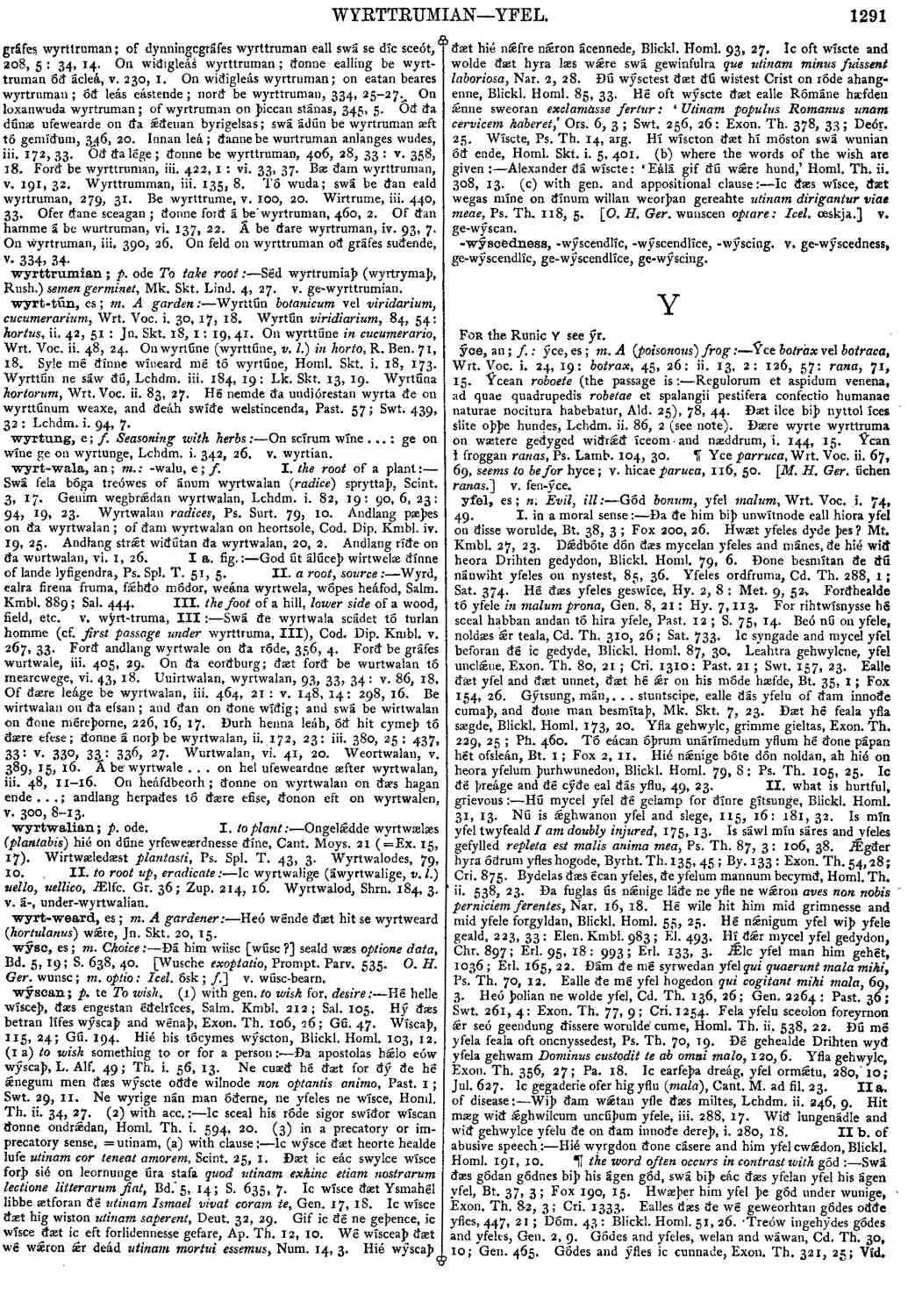wýscan
- verb [ weak ]
-
Hé helle wísceþ, ðæs engestan éðelríces,
- Salm. Kmbl. 212; Sal. 105.
-
Hý ðæs betran lífes wýscaþ and wénaþ,
- Exon. Th. 106, 26; Gú. 47.
-
Wíscaþ,
- 115, 24; Gú. 194.
-
Hié his tócymes wýscton, Blickl. Homl. 103, 12. (1 a)
to wish
something to or for a person :-- Ða apostolas hǽlo eów wýscaþ,- L. Alf. 49; Th. i. 56, 13.
-
Ne cuæð hé ðæt for ðý ðe hé ǽnegum men ðæs wýscte oððe wilnode
non optantis animo,
- Past. 1; Swt. 29, 11.
-
Ne wyrige nán man óðerne, ne yfeles ne wísce,
- Homl. Th. ii. 34, 27.
-
Ic sceal his róde sigor swíðor wíscan ðonne ondrǽdan,
- Homl. Th. i. 594, 20.
-
Ic wýsce ðæt heorte healde lufe
utinam cor teneat amorem,
- Scint. 25, 1.
-
Ðæt ic eác swylce wísce forþ sié on leornunge úra stafa
quod utinam exhinc etiam nostrarum lectione litterarum fiat,
- Bd. 5, 14; S. 635, 7.
-
Ic wísce ðæt Ysmahél libbe ætforan ðé
utinam Ismael vivat coram te,
- Gen. 17, 18.
-
Ic wísce ðæt hig wiston
utinam saperent,
- Deut. 32, 29.
-
Gif ic ðé ne geþence, ic wísce ðæt ic eft forlidennesse gefare,
- Ap. Th. 12, 10.
-
Wé wísceaþ ðæt wé wǽron ǽr deád
utinam mortui essemus,
- Num. 14, 3.
-
Hié wýscaþ ðæt hié nǽfre nǽron ácennede,
- Blickl. Homl. 93, 27.
-
Ic oft wíscte and wolde ðæt hyra læs wǽre swá gewinfulra
que utinam minus fuissent laboriosa,
- Nar. 2, 28.
-
Ðú wýsctest ðæt ðú wistest Crist on róde ahangenne,
- Blickl. Homl. 85, 33.
-
Hé oft wýscte ðæt ealle Rómáne hæfden ǽnne sweoran
exclamasse fertur: 'Utinam populus Romanus unam cervicem haberet,'
- Ors. 6, 3; Swt. 256, 26: Exon. Th. 378, 33; Deór. 25.
-
Wíscte,
- Ps. Th. 14, arg. Hí
- Alexander ðá wíscte: 'Eálá gif ðú wǽre hund,' Homl. Th. ii. 308, 13.
-
Ic ðæs wísce, ðæt wegas míne on ðínum willan weorþan gereahte
utinam dirigantur viae meae,
- Ps. Th. 118, 5.
Bosworth, Joseph. “wýscan.” In An Anglo-Saxon Dictionary Online, edited by Thomas Northcote Toller, Christ Sean, and Ondřej Tichy. Prague: Faculty of Arts, Charles University, 2014. https://bosworthtoller.com/37050.
Checked: 0